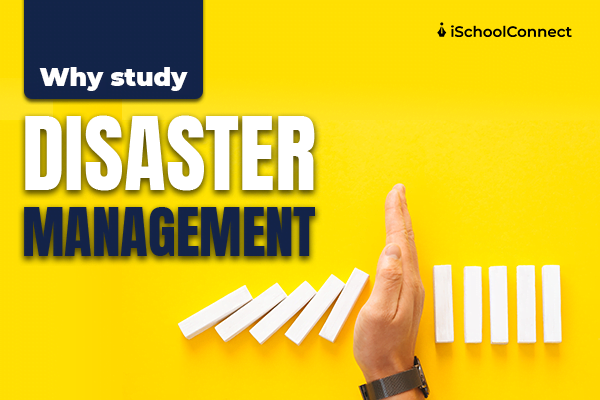Table of Contents
- What is disaster management?
- Role of a disaster management specialist
- Responsibilities of a disaster management specialist
- Skills needed in the disaster management career
- Subjects taught in disaster management courses
- Top courses
- Eligibility and requirements
- Course fees
- Job prospects after course completion
- Salary of disaster management specialists
- What is next?
- FAQ
Many disasters are out of our control, whether they are caused by natural events or human activity. And while meteorologists can forecast most natural disasters, some may slip their radar. This makes disaster management even more crucial.
Besides, understanding and preparing for disasters like nuclear explosions, stampedes, earthquakes, hurricanes, etc., comes in handy at such times. This is where a course in disaster management can literally save the day.
What is disaster management?
According to UNDRR, “A disaster is a serious disruption of the functioning of a community or a society, which involves widespread human, material, economic or environmental impacts that exceed the ability of the affected community or society to cope using its own resources.”
Disaster management is essentially the planning and resultant strategies we, as humans, use to either prevent or mitigate the harmful effects of natural or even man-made disasters.
There are many types of disasters, such as-
- Natural disasters
- Man-made disasters
- Pandemic emergencies
- Complex emergencies
- Hybrid disasters
So, if you choose to enroll in this program, then you should know that there is a wide range of subjects taught in such courses. Read on to learn 9 things about disaster management!
Role of a disaster management specialist
As a specialist on this subject, you will have to design as well as direct mitigation programs to help with relief activities in the aftermath of a natural disaster. In this role, you will not only deal with natural disasters but may also have to face technological and economic disasters.
This subject entails a wide spectrum of disasters and ways to manage them. Hence, disaster management specialists need to prepare themselves to manage disasters of any type and intensity.
Responsibilities of a disaster management specialist

Since this job title is quite a dynamic one, you will need to prepare yourself to face an array of tasks and responsibilities. Here are some common responsibilities that you would have to carry out as a disaster management specialist-
- Conduct assessments to understand the extent of damage to property as well as the loss of life.
- Proactively coordinate with local government officials from the local or National Disaster Management Authority of the affected region.
- Supervise certain crisis management activities like the building of emergency shelters and assisting in the evacuation of certain areas.
- Assess the needs of survivors and refugees in some cases and coordinate with local hospitals accordingly.
- Ensure that all activities related to relief and management of disaster take place within the permitted legal boundaries.
Skills needed in the disaster management career
Mitigation in disaster management is an important technique to reduce or limit the aftermath of a natural disaster. To do this, you will need to develop skills such as-
- Remaining calm and open-minded during the time of a disaster.
- Thinking critically to select the safest and most feasible solution for all.
- Have an organizational mindset so you can be more effective during and after the disaster strikes.
- Problem-solving skills of an advanced level to deal with a diverse range of disasters.
- Ability to communicate ideas and plans effectively during the chaos that ensues after a disaster has run its course.
- Be flexible enough to make quick and effective decisions.
Subjects taught in disaster management courses
Since this field is vast and can encompass all kinds of disasters, you will be taught about several subjects in this course. Some of the most common subjects you will learn in this program are-
- Hazards, Risks, and Disasters
- Field Skills
- Disaster Theory, Statistics, and Logistics
- Disaster Mitigation, Preparedness, and Response
- Earth catastrophes, Fire and Explosion
- Understanding Natural and Man-made Disasters
- Disaster Medicine
- Rehabilitation, Reconstruction and Recovery
- Strategies for Survival
- Risk Analysis Techniques
- Resources Analysis and Mobilization
- The Experience of Vulnerability
- Disaster Preparedness (various aspects)
- Logistics Management
- Communication, Participation, and Activation of the Emergency Preparedness Plan
Top courses

There are five prominent disaster management courses that you can enroll in if you wish to take up this subject as a professional career. Let’s look at them one by one-
MBA or Postgraduate Diploma (PGB) in Disaster Management
This is usually a two-year-long course, at the end of which you can gain employment as an emergency management specialist. You will need to have a graduate degree in any field in order to qualify for it.
MA in Disaster Management
This course teaches students to formulate strategic action plans in times of disaster. Having gained extensive knowledge about disaster mitigation through this two-year postgraduate program, you can apply for the post of a specialist at several government offices as well as NGOs after graduation.
MSc in Disaster Management
This is also another fruitful postgraduate degree that will equip you with sound scientific knowledge about disasters. After completing this two-year-long course, you can easily pursue a Ph.D. in this discipline and become a research scholar.
Ph.D. in Disaster Management
To be eligible for this program, you will need your post-graduation in any related discipline. This course spans about 4 or 5 years and opens the doors for research into this subject for you. Further, you can either work for a stipend at a government institute or seek full-time employment at private research institutes.
Eligibility and requirements
The eligibility and requirements for admission to a disaster management program may differ based on the course you are applying for-
MA in Disaster Management
You need a bachelor’s degree in any discipline with a minimum of 50% marks from a recognized university.
MA in Disaster Management
You will need a bachelor’s degree in any discipline from a recognized university. However, you also need to appear for entrance exams and interviews for admissions.
MSc in Disaster Management
For this course, you need a bachelor’s degree with a minimum of 55% marks in any of the following subjects-
- Environmental science
- Geography
- Civil engineering
- Geology
Ph.D. in Disaster Management
If you have completed your Masters or M.Phil in a relevant discipline with a minimum of 55%, you can apply for a Ph.D. in this course.
Course fees

The course fees for a disaster management program abroad can be between $15,000 and $30,000, depending upon the university or college you choose to enroll in.
While these are the standard course fees for a typical one-year course in most developed countries, the same is much lower in developing countries. The tuition fees for such a course in some of the most prominent developing countries are about $1,000.
Job prospects after course completion
Since so many different subjects are taught in a disaster management course, you will have a significant offering of choices for job prospects. Both government and private organizations recruit specialists who are formally trained in managing and mitigating natural disasters.
Some of these jobs may involve-
- Research
- Teaching
- Consultancy
- Extensive documentation, and
- Administration work
You can also take up organizing and conducting field training to increase awareness about preparedness in disaster management.
Salary of disaster management specialists
Considering that management of disasters is a job role that is often considered under emergency services, the salary is quite decent. In most developed countries, the annual salary of such specialists ranges from $42,000 to $120,000.
The same job in certain developing countries can fetch you around $5,500 annually.
So, all in all, this can still be a profitable career path for you. This is because this profile is in high demand globally as there is a need for highly qualified professionals in this field.
What is next?
Since the subject of disaster management is a lucrative field of study, you may consider taking it up as your career path as well. Through these courses, you will not only obtain gainful employment abroad but can also apply your skills to make a positive impact on society.
Learn more about this and various other fields from our blogs. You can also contact us for more information or drop a comment below.
Until next time!
Liked this blog? Read: Environmental studies | Learn if this is the best course for you!
FAQ
1. How does disaster management work?
Answer- It generally works through the policies and procedures of the governing bodies. However, it is not possible to execute without the cooperation and coordination of the public.
2. Why is disaster management important to us?
Answer- It’s important because it can help us take quick and rapid action when disaster strikes. This can help save lives and reduce the damage caused to property as well.
3. What is a disaster management course?
Answer- This course helps students learn more about disasters, including preparedness, mitigation and rehabilitation. It teaches about all kinds of disasters, why they are caused, and how to work around them.







Can We do PHD after PG DIPLOMA IN DISASTER MANAGEMENT
Hey,
If your PG diploma is equivalent to the master’s degree, i.e, the duration of the degree, only then can you do PhD or M.Phil in disaster management.
All the best!
Need school as disaster management
Hey,
One of our counselors will get in touch with you soon!
All the best.
You can also contact us-
Email- info@ischoolconnect.com
Phone +91 9145332283